Social media has become an integral tool for marketing. The amount of social network users is so dramatic, that it’s not worth neglecting the opportunity to make use of it. In this article, I’m sharing 8 ways to boost your brand’s public awareness, regardless of the social media platform you work on. It will be of particular use for social media and digital marketers as well as those who are interested in how social media work in general.
1. Know your audience

Before you start the promotional campaign, you should know your target audience. Learn more about the habits of those who might be interested in your brand to adjust your content accordingly. Knowing the average age, sex, social group, and other factors about your audience will help you choose not only the right style of writing but also the tone of your posts. For instance, it is no use posting memes, if your target audience consists of single mothers over their forties.
The best practice in the marketing field is to create a portrait of a typical customer. Whatever the content, you need to know how to serve it, to whom and when present it, where the main target audience is concentrated, which groups of the target audience are ready to share it here and now, and which need to be heated.
An example of the target audience portrait (car purchase):
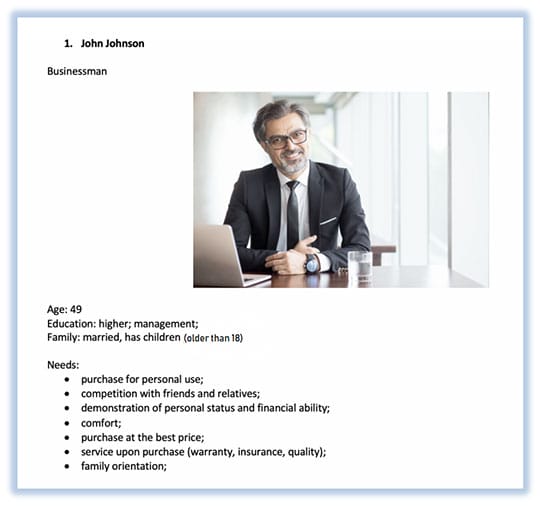
Moreover, you will be able to determine the interests of the audience and what they are looking for in general. If you know what they talk about, then you will be able to create a piece that would make them respond. To gather such kind of data, both Twitter and Facebook offer their unique tools to analyze the public. All you need to do is to learn how to use them correctly.
For instance, Innocent Drinks has shown the potential of a successful promotional campaign by utilizing the knowledge of whom their consumer base consisted. They specifically targeted those who were interested in their product and made the best out of it: a company has been steadily showing growth in its market share over the years.
Recommended for you: Keep a Tab on Your Brand’s Performance on Social Media for Continued Improvement.
2. Be where your audience is

If you want to reach a wider audience, then you definitely should use more than one social media platform. Of course, you could post the same content at all your profiles, but what will it result in? If a person has seen your post on Facebook, they are unlikely to react to it when they see it on Instagram or Twitter again. A good trick would be to post something unique at different platforms to make your public interested in checking it out. What you should remember, though, is that every platform differs from others, so it is no use trying to post a 2000-words-post on Twitter, but we’ll get back to it a bit later.
Being present at different platforms will ensure that you reach a bigger audience. Of course, most users have accounts at more than one social platform, though, there are those who prefer only one of them. Additionally, depending on the time of the day, some people might prefer Twitter over other platforms, because posts there are a lot shorter. If a person gets interested in your piece, they will definitely come back to it later.
The research has shown that only two-thirds (66%) of Fortune 500 companies use YouTube, less than half (45%) use Instagram, a little more than a third of them (36%) run corporate blogs, and a third (33%) use Pinterest. If you are not present on these or other platforms, you are missing valuable business opportunities.
Let’s explore how the Buffer app recently improved its performance by starting to publish fewer posts on Facebook. It was noticed that not every post considered to be good enough for customers, is the right fit for Facebook. They decided to divide content strategy into several social media channels to provide more suitable and readable content for each audience.
It’s easier to understand when doing a little experiment. Imagine that you are going to buy a new pair of shoes. Are you going to explore a long-read Facebook post of Nike or New Balance brands pages about how cozy and suitable they are? Of course, no. You need to see pictures of brand new models, see the style of people who wear them, know the price and material they made of.
So, while choosing promotion channels in social media, think carefully about which ones you need to use and which will not suit you. Once you have identified a problem and suitable platforms, start creating content that will be valuable to your audience.
3. Determine the best timing

Having analyzed your public, you might learn the time of their peak activity. This can be determined by the number of comments and reposts they make. As a result, make sure that you post your articles in that particular time-frame to reach the biggest number of your followers. Keep in mind, however, that there might be two or even three peaks a day, so you should either choose the most detrimental one or make more posts. Mastercard has shown that the timing is crucial. Once, they have focused on The Cubs baseball team to maximize the effectiveness of their campaign. How? They waited for the best moment to release their content, which was right after the World Series final and thus reached a tremendous number of people, boosting their popularity as a result.
You should also pay attention to various holidays and special events. For example, if you deal with the latest technological trend reviews, you should always be aware of numerous exhibitions, presentations, etc. When such an event occurs, you can easily make a post that will engage your readers in a discussion. Also, you can share your personal opinion on this or that stuff and ask your audience for their opinion.
When to post to Facebook?
To begin with, explore the data analysis from Bit.ly service. According to them, it is best to publish posts between 1 PM and 4 PM. And the most clickable links appear on Wednesday at 3 PM. The general statistics of this social network indicates that traffic begins to grow at 9 AM and after 4 PM pm begins to subside.

What about the best time for Instagram posts?
Let’s analyze the days of the week:
- Monday. Not the best day for information that makes you think, make a decision. On this day it is best to add entertainment content: humorous pictures, tips, motivation, etc.
- Tuesday. The transition from the weekend to the workflow is over, subscribers are ready to accept important information. Share analytics and numbers.
- Wednesday. Many brands prefer to post an internal process, show the results of work. Share your participation in important conferences, contribution to social projects.
- Thursday. Tell about your clients. Share your activities with customers. Many companies use this trick.
- Friday. As well as on Monday, it is better not to leave important information in subscribers’ feeds. They will be more excited about the fun and encouraging content ahead of the weekend.
- Weekends. If the desire remains, you can publish easy and enjoyable content or plans for the next week, motivating subscribers.
- from 2 PM to 5 PM;
- from 1 PM to 2 PM;
- 2 PM on Tuesdays;
- 5 PM – 6 PM on weekends, at 8 PM – day off.
4. Create a schedule

You should know what days of the week exhibit the top activity in your group, and post accordingly. For example, if your audience consists mainly of working people, then it is probably a good idea to post something important on Thursdays and Fridays.
Why? Because most of the white-collars have a 40-hour work week, and most of them are probably less concentrated on their work on these days and have more time to log in their social media profiles.
Moreover, a good schedule will help you create a content plan and force you to prepare your posts beforehand. When you have everything arranged, it will be easier for you to handle more than one profile at a time. Finally, scheduling your posts using various tools may help you avoid situations when it is either inconvenient to make another post manually, or you simply forget about doing it.
Notably, there are many solutions that can offer you outstanding scheduling options. Some of them like Sendible or CoSchedule feature paid plans, while TweetDeck is completely free. Moreover, you can schedule posts using the in-built Facebook functional, too.
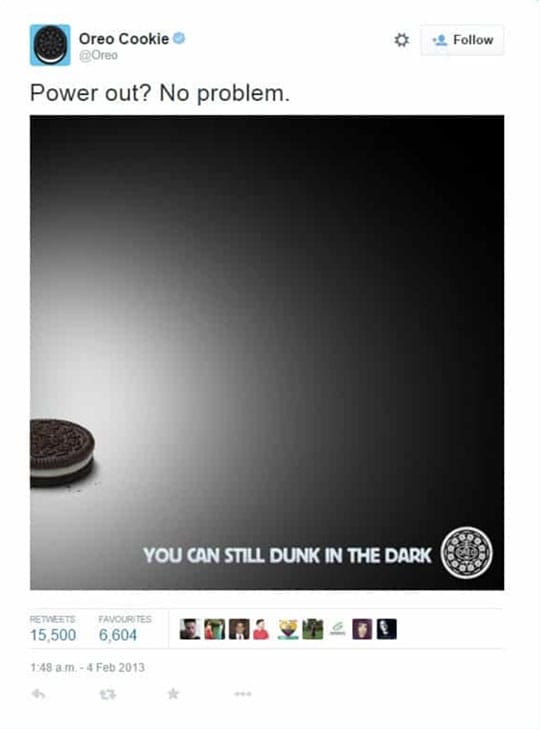
Sometimes companies are able to generate a large number of posts in social networks quickly enough. And that works pretty well. Let explore the example of Oreo company. Do you remember Super Bowl of 2013? Of course, you do! The company showed the professional art of creating SMM publications in real time. Recall the same historical tweet, which created a sensation among fans of the American Super Bowl. So, during the match at the stadium, the lights went out … Well, it’s time for high-quality posting on social networks!
5. Adjust your visuals’ format for each platform

From the above, it is obvious that the formatting of your posts for various platforms should differ a lot. For instance, you created a great piece on Facebook, and you want it to be appreciated by your Twitter followers and Instagram subscribers. For this reason, you should make a short annotation with a fancy picture (don’t forget to include the link to the original post, though) on Twitter, and add a couple of hashtags on Instagram. As time goes, you would probably want to introduce your own hashtag that would stand out from the rest.
Another important aspect to mention is the dimensions of the images you post. Given that most people surf the web using their mobile phones, it is a good idea to use vertically-oriented (9:16) or squarish (2:3, 3:5, 4:5) images for the best result.
Another thing you should keep in mind is that different platforms are best suited for different image formats. Instagram, for instance, is still more of a square image platform, although now they allow other formats as well. Plus, it is important to take care of the grid layout. Instagram accounts with consistent grid layouts are more popular and attract more audience. Same applies to Twitter. In case you don’t know how to create a more cohesive feed, use tools like Preview for Instagram and Canva if you need designs for other platforms.
In order to study the influence of images on the degree of audience involvement – the number of retweets, clicks, and so on, the Buffer service found that tweets with pictures receive 150% more retweets than regular text posts.
They took their last 100 tweets and researched that tweets which contained images had received more shares and likes than ones they didn`t have. It is a real psychology trick. First of all, your attention is stuck on something colorful and shaped. Then you need an explanation, so you reach the text.
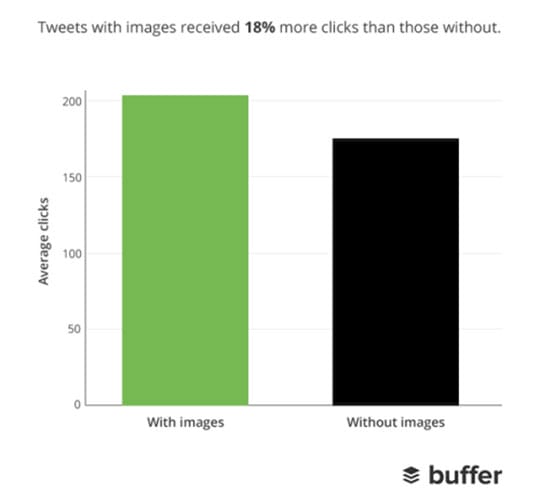
Experimenting with the sizes of images that are guaranteed to work well in social media, two universal image sizes were found: 1024 x 512 pixels for landscape (horizontal) orientation and 800 x 1200 pixels for portrait (vertical) photos.
Square pictures with a resolution of 1200 x 1200 pixels are best suited for Facebook and LinkedIn news feeds, landscape pictures with a resolution of 1200 x 627 pixels will also fit perfectly into Facebook or Twitter posts, and portrait images with a resolution of 736 x 1128 pixels can be successfully used on Pinterest and Google+.
In general, for sharing images in social networks, the following ideal dimensions (in pixels) are distinguished:
- Facebook – 1200 x 628
- Twitter – 1024 x 512
- LinkedIn – 800 x 800
- Google+ – 800 x 1200
- Pinterest – 735 x 1102
- Instagram – 600 x 600
You may like: 7 Tools Every Social Media Manager Should Use for Marketing Campaigns.
6. Make your profiles alive

The first thing you need to know is that it is really hard to handle several profiles at a time. Though, it is essential when it comes to boosting your brand’s awareness. The bigger your audience gets, the harder it becomes to have an eye on every aspect of your social media profiles. Though, nobody’s saying that you have to deal with all of them on our own, right?
One of the ways to keep your profiles alive is to post there regularly. Your content should be fascinating as always for your audience to grow. At some point, there might be stagnation, however, when you don’t see real results of your work. Don’t let that discourage you, though, even if it seems that you can’t reach more people, you need to keep your profiles alive and do not give up.
Another great move to utilize is to interact with your audience, rather than just posting content exclusively. Make sure you respond to comments and direct messages. You can even start the ‘ask me anything’ game, depending on the number and kind of subscribers you have.
It’s a great chance to become a little closer to your auditory. But such marketing strategy has some failure examples. However, you should always mind what you say and weigh the wording carefully so as not to make the same mistake as Adidas did the other day. Once, they sent emails with a headline “Congrats, you survived the Boston marathon.” Not a big deal right? Not for a US citizen, who perceived this as a reference to the Boston marathon bombings of 2013.
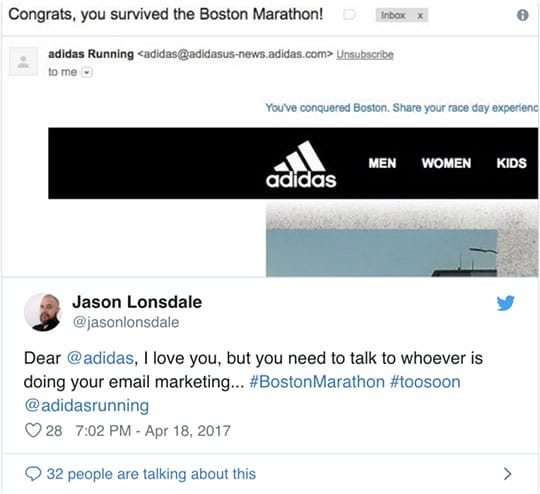
The email was sent to thousands of customers and put the company in an uncomfortable position.
On the other hand, there is JetBlue, who use their Twitter account as a mean of providing customer support services instead of posting only news and updates as other companies usually do.
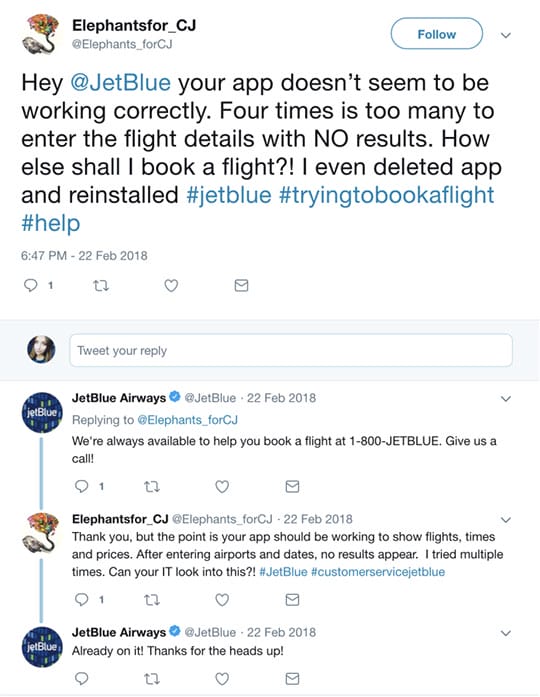
7. Make use of analytics tools
Facebook and Twitter both offer you great toolsets to analyze your social media profiles. These tools will help you determine various factors that are important for building up the popularity of your brand. These features include the reach rate, engagement rate, and other data that can help you adjust the content to meet the interests of your audience.
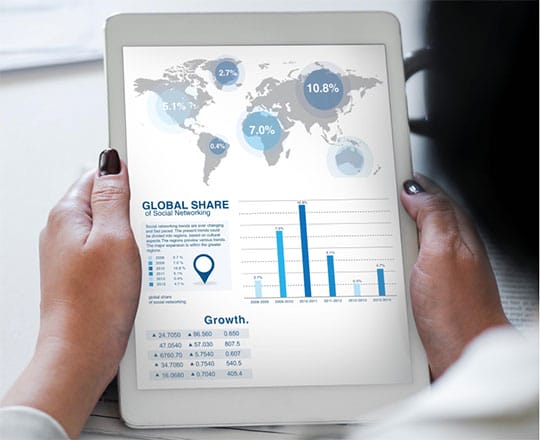
Having compared the results of strategies used by top-3 US mobile operators, it is worth saying that AT&T, despite having a smaller clientele, manages to engage more people with their posts, if compared with their rivals like Verizon or T-Mobile. Of course, any advertising campaign requires a budget to be spent, but it is a worthy investment, right?
Moreover, you should constantly look for opportunities to increase your brand awareness with the help of other social media groups. For instance, you can subscribe to those pages that are similar to yours, and leave comments, like links to your profile, from time to time. In addition, you could subscribe to the pages your audience is interested in, and be active there too for the same reason.
8. Iterate on your campaigns

Each campaign you do will give you a lot of data to analyze.
You should think about what you did right and what should be improved in order to reach more people. For example, Facebook Pages allows you to see the way the public perceives your content (the number of reactions, comments, shares, etc.).
Based on this, you can adjust your posts accordingly and witness changes. Whether positive or not, every campaign gives you an opportunity to learn and improve. What you should avoid is that feeling of frustration, when you think that nothing works for you.
In such cases, ask for help, or analyze what you are doing wrong. Sooner or later, you will leach the long-lasted boost, just do not give up.
A good example Sitechecker.pro. It’s a service popular among SEO and marketing specialists who want to improve website technical health and receive a comprehensive SEO audit. When the project has been launched it was decided to promote Sitechecker via Facebook posts. First posts were pretty informative and aimed at solving important problems of the target audience. But they haven’t reached numerous likes and shares.
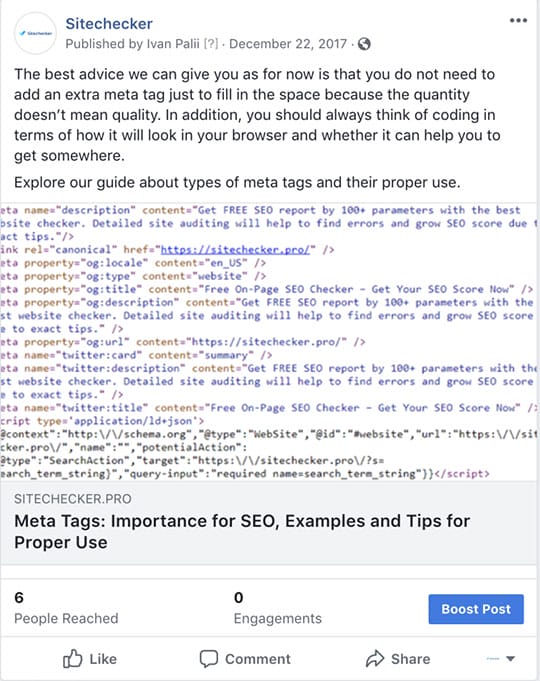
Why? The answer was in a type of content provided. Customers wanted to know more about new features and possibilities to use the tool rather than read useful articles. SMM strategy was refreshed and included more visuals, news from developers and notes how to use it efficiently.
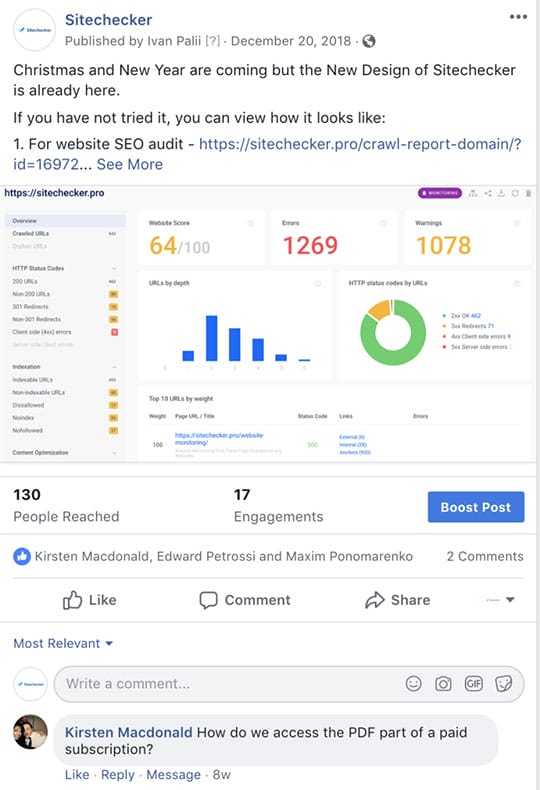
You may also like: 7 Social Media Trends that Change the Game for Ecommerce Websites.
Wrapping it all up
Social media marketing has become a vital aspect of modern businesses. Each social network has its own unique features that should be taken into account, before starting your promotional campaigns.
However, there are aspects that are pretty much the same no matter which platform you choose. Remember that knowing your audience is a vital step towards the increase in the popularity of your brand. Having learned them better, it will be possible for you to use their interests and habits for your benefit.
Right timing and scheduling are also important if you want to see obvious results as soon as possible. If you post a great piece at the wrong time, then you should forget about reaching a lot of people. Get your audience interested in your profile by making it look alive. Post regularly, respond to comments, ask questions, all these activities will make the public feel interest in your social media profile.
Finally, you should analyze the results of your campaigns, to have the opportunity to adjust your content accordingly. To put it simply, you should learn, try, analyze and adapt.



